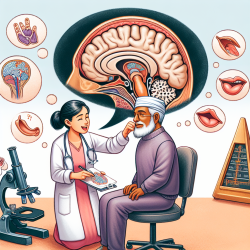Unlocking Potential: Bridging Cerebral Physiology and Educational Success
In the realm of speech-language pathology, understanding the intricate relationship between cerebral physiology and education is crucial for creating effective interventions for children with special needs. The research article, Cerebral Physiology and the Education of Abnormal Children, by James Kerr Love, offers a profound exploration of this connection. By leveraging the insights from this study, practitioners can enhance their skills and improve outcomes for children.
Understanding Cerebral Physiology
Cerebral physiology refers to the study of the brain's functions and how these functions influence behavior and learning. Love's research highlights the importance of understanding the physiological differences in children with special needs. This understanding can guide practitioners in tailoring educational strategies that align with each child's unique neurological profile.
Key Insights for Practitioners
Here are some actionable insights from the research that practitioners can implement:
- Individualized Learning Plans: Recognize the diverse cerebral profiles of children and develop personalized learning plans that cater to their specific needs.
- Data-Driven Decisions: Utilize data from cerebral assessments to inform intervention strategies, ensuring that decisions are based on concrete evidence rather than assumptions.
- Collaborative Approach: Work closely with neurologists and educators to create a holistic support system for the child, ensuring that all aspects of their development are considered.
- Continuous Monitoring: Regularly assess the child's progress and adjust strategies as needed, maintaining a dynamic approach to their education.
Encouraging Further Research
While Love's research provides a foundational understanding, it is essential for practitioners to continue exploring the latest developments in cerebral physiology and education. By staying informed about new findings, practitioners can refine their approaches and contribute to the evolving field of speech-language pathology.
For those interested in delving deeper into this topic, the original research paper offers a wealth of information and can be accessed here: Cerebral Physiology and the Education of Abnormal Children.
Conclusion
Incorporating insights from cerebral physiology into educational practices can significantly enhance the learning experiences of children with special needs. By adopting a data-driven, individualized approach, practitioners can unlock the potential of each child, paving the way for their success.










